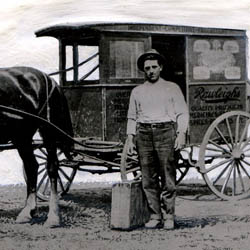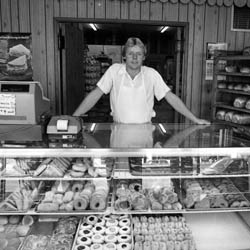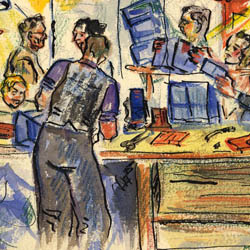Retail has been defined as the sale of goods or commodities in small quantities directly to consumers. Saskatchewan retail workers are found in a wide variety in locations - from small corner or convenience stores; independent bakeries, butcher shops or clothing stores; to local outlets and franchises of national grocery, drug, hardware and clothing chains. Large general department stores carrying a wide range of products may still be found in Regina, Saskatoon, and a few smaller communities.
As communities sprang up across southern Saskatchewan in the settlement era many independent merchants established stores to sell grocery products, dry goods, drugs, and hardware. Also relatively common were local butcher shops and bakeries. After the First World War, Saskatchewan became the site of many retail cooperatives, almost all now associated with Federated Co-operatives Limited.
During both the settlement and post settlement era Saskatchewan's farm population was widely scattered over a large area. Before personal cars became common and work began in earnest on the construction of reliable road systems, home visits by travelling merchants, including the independent representatives of such firms as Watkins and Rawleigh, provided retail opportunity. The tradition of direct home visits and sales has been continued by such firms as Avon and Tupperware. Many goods were also purchased from mail order catalogues distributed by such firms as Eaton's, Simpsons and the Army & Navy Stores. The receipt and processing of these orders, as well as the shipment and delivery of goods, to smaller communities provided many jobs.
From 1925 to 1986 the Army & Navy Store, self described as 'Canada original discount store', maintained its mail order division in Regina. The store specialized in low-cost consumer products, many of which were sourced from distress or bankruptcy sales. Many cash poor consumers depended upon the store during the Depression, often paying with government relief cheques. The mail order department once advertised 12 hour service.
At present many chain stores in Saskatchewan advertise a wide variety of goods at low prices. Some lament the curtailment or elimination of traditional retail services such as bagging and wrapping, lay away plans, and the delivery of purchases, all of which are labour intensive. In many larger department stores, checkout and payment has been separated from the duties of floor staff, and several large grocery chains are now encouraging if not requiring self check-out and bagging. Some consumers complain that there is often a shortage of knowledgeable sales staff on store floors; on the other hand some chains have recognized the importance of well trained floor staff in maximizing sales, and have provided motivation to them through commission plans.



![Grocery Store, ['ca. 1920']](cropthumbs/R-A7216.jpg)

![Interior View of Billie Maslen's Butcher Shop, ['1910']](cropthumbs/LH-3700.jpg)
![Butchers at Work, ['ca. 190-']](cropthumbs/PH-96-28-2.jpg)

![Maidstone Co-op Home Staff, ['20 September 1947']](cropthumbs/2008-32-7-MCH.jpg)
![Del. Bob Benjamin Pays for Farm Supplies at <br />Swift Current Farm Service Centre, ['1980']](cropthumbs/MG247-10-FarmServiceB-215.jpg)
